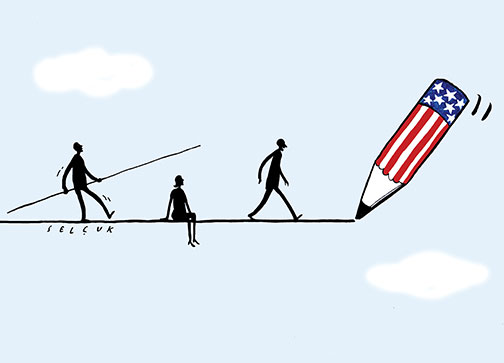Learning American Culture Can Be Big Test for International Grad Students
At a recent language workshop meant to help international students work effectively in groups, several graduate students puzzled over when it made sense to start a sentence with “How about” rather than “What about.” Andrea Villamil, a Woodrow Wilson School master’s degree student from Mexico, observed, “The language makes no sense sometimes, but that’s the least of it. The huge difference in cultures is what really matters!”
Such is the life of doctoral and master’s candidates from other countries — some 40 percent of all Princeton graduate students — who must meet the same demanding academic and social expectations as their American-born colleagues while contending with significant cultural and linguistic obstacles. To international students, American culture can seem downright, well, foreign.

Living in an English-speaking environment is a common cause of frustration. Inés Cruzalegui, a Wilson School master’s student from Argentina, said her personality doesn’t come through in English: “I can’t be sarcastic, even though I am really sarcastic in Spanish. ... You feel shy — it’s harder to express yourself, and that’s frustrating.”
Hugging? There’s way too much for Takehiko Ito, a psychology Ph.D. student from Japan, and far too little for Villamil. American food? Dongwon Oh, a psychology Ph.D. student from Korea, loves it, while Cruzalegui hates it.
And several students agreed that Americans are far more ready to voice opinions and ask questions in class than students in their home countries.
The residential university is itself an oddity. Student dorms, Villamil said, remind her more of the gymnastics camp she attended for three weeks at age 9 than of her undergraduate university in Mexico City, where most students lived at home.
Ito, a frequent visitor at Terrace Club, said he enjoyed the fact that, unlike in Japan, “even though people are not good at it, they are dancing. In Japan, people are often too shy to dance.”
Overall, the grad students said they are happy to be here. As Tsung-Lin Hsieh, an atmospheric sciences Ph.D. student from Taiwan, put it, “Before coming here, I thought that there is just one big popular culture, and in order to adjust, I would need to do the same things, watch the same movies, and listen to the same music. But now I think no. Everybody has their own thing, and it’s OK to be yourself.”












No responses yet